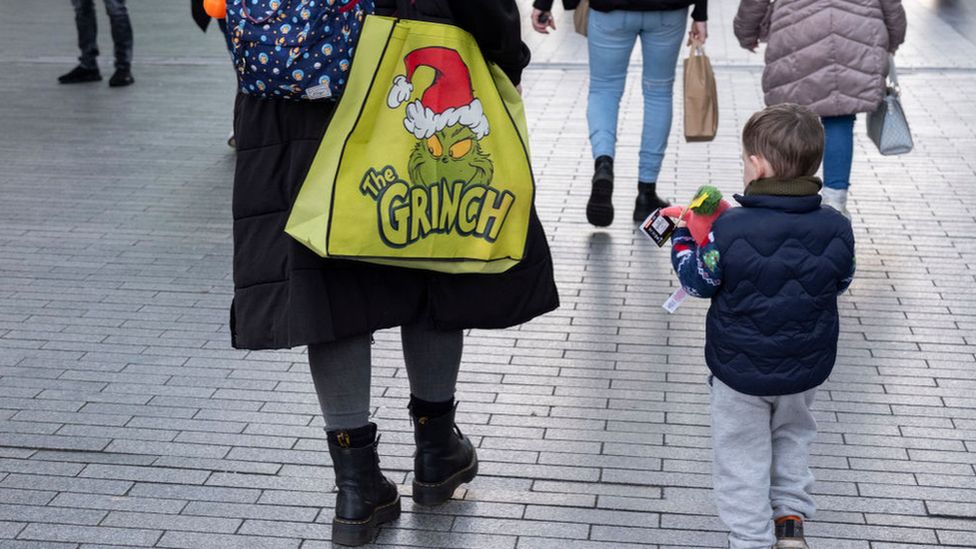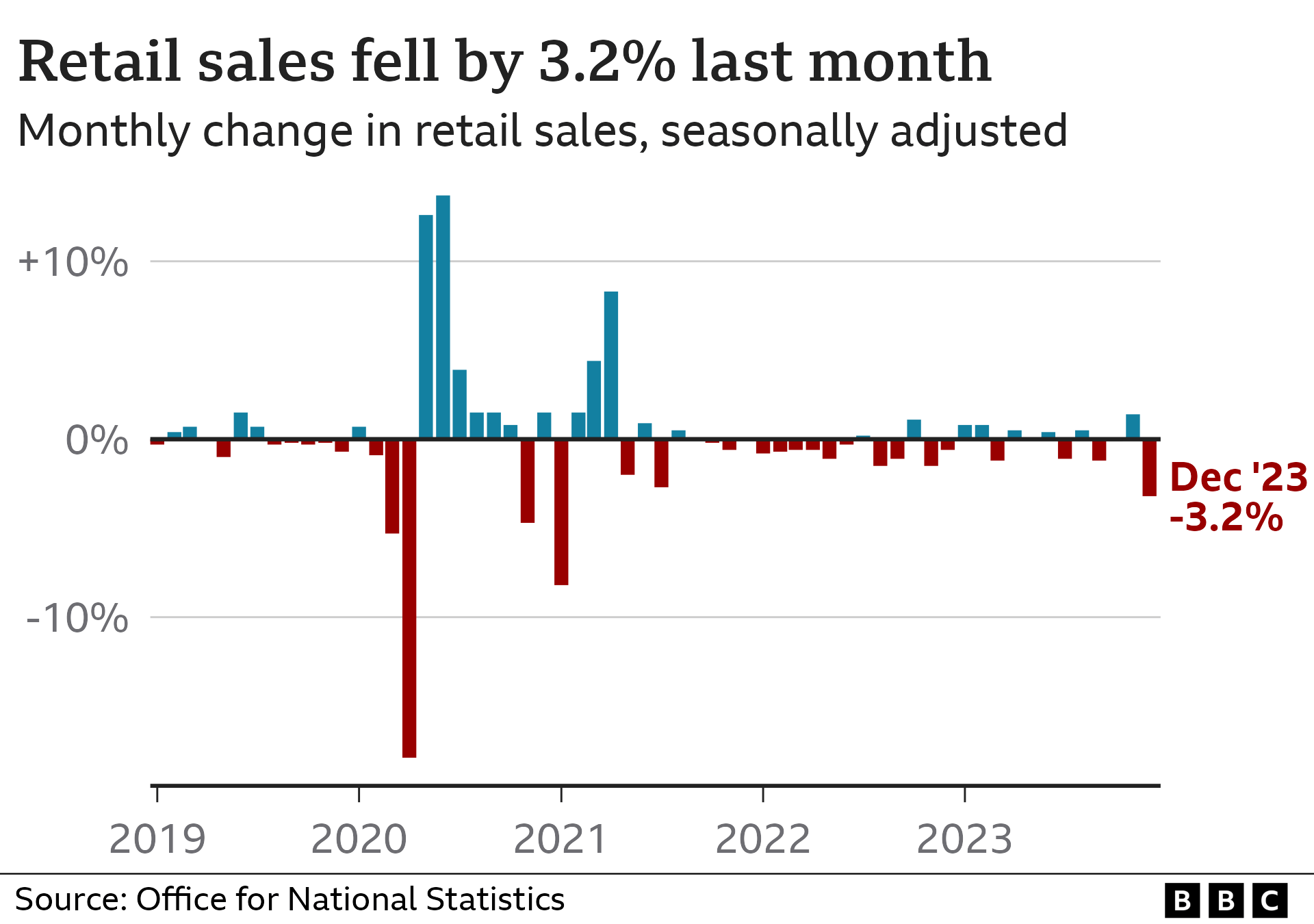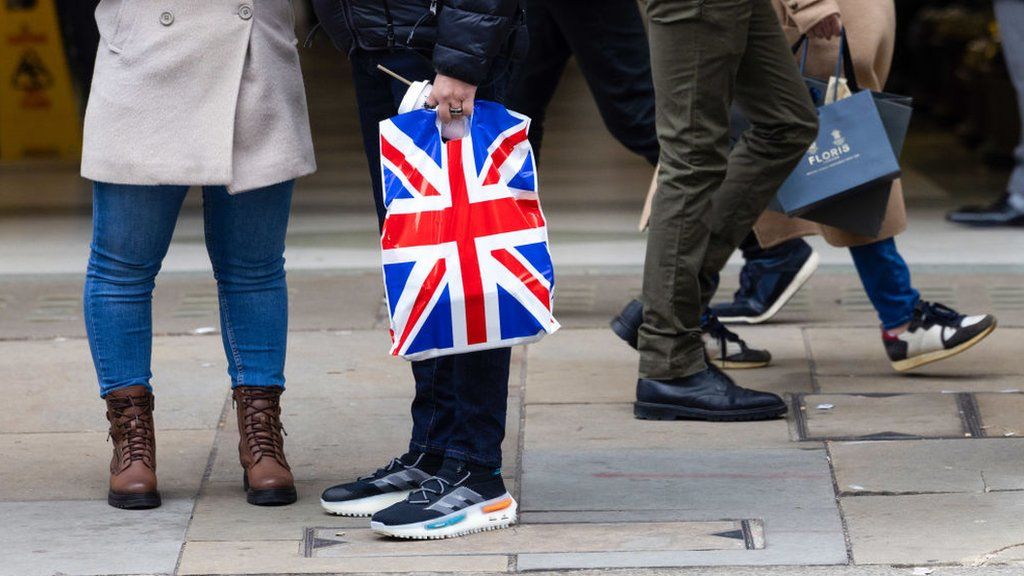
Retail sales volumes fell by 3.2% in December in the sharpest drop since the UK was in a Covid lockdown.
Official figures revealed a sharp fall in demand for goods, but food sales also declined in the run-up to Christmas.
The Office for National Statistics (ONS) said it appeared people did their shopping earlier in November, taking advantage of Black Friday sales.
It meant that retail sales tumbled at the fastest rate since January 2021.
The ONS said the amount of non-food products people bought in December fell by 3.9%, with department stores the worst hit. That compares to a 2.7% increase for non-food products in November.
Food demand was also down at the end of the year, falling 3.1%. In November, food sales rose by 1.1%.
Lisa Hooker from PwC said there were “fewer large family gatherings reducing the number of gifts being bought overall”.
She added that people “reined back on areas such as toys, sports equipment, watches and jewellery,” but said fashion was “one of the least affected categories”.
Heather Bovill, deputy director for surveys and economic indicators at the ONS, said December’s fall in retail sales was “the largest overall monthly fall since January 2021, when the reintroduction of pandemic restrictions knocked sales heavily”.
- Shoppers and retailers set for ‘challenging’ 2024
While she said that discounting in November encouraged people to shop earlier for Christmas, there was also evidence from department stores, clothing retailers and those selling household goods that consumers spent less on gifts.
While the fall was the biggest since January 2021, when further Covid restrictions were enforced, the actual volume of goods that people bought in December was the lowest since May 2020 when the country was in the first Covid lockdown.

Supermarkets have been reporting strong sales over the Christmas period, although the value of their sales has been helped by rising prices over the past year.
For non-food stores the pattern has been mixed. Fashion chain Next enjoyed strong sales, but JD Sports issued a profit warning after its trading was weaker then expected.
Specialist wine outlet Majestic said it had seen record sales in the run-up to Christmas, helped by a rebound in its trade with the hospitality sector.
However, chairman and chief executive John Colley told the BBC’s Today programme that, overall, consumers were still reeling from the high food prices seen over the previous 12 months.
“I think we’ve still got fallout from inflation… and I think consumers are still feeling the pinch and I don’t think that’s over, even now.”
Earlier this month, the British Retail Consortium predicted a “challenging” year ahead for the sector with household budgets still being squeezed by higher living costs.
The worse-than-expected retail sales also raise the risk that the UK ended 2023 in “the mildest of mild recessions”, according to Alex Kerr, assistant economist at Capital Economics.
A recession is typically defined as two three-month periods – or quarters – in a row of shrinking economic output.
The UK economy shrank by 0.1% between July and September. It contracted again in October but bounced back in November.
Mr Kerr said that even factoring in the effect of Black Friday sales on shopping, December’s drop was “far bigger” than expected.
“That may have been partly because of consumers bringing forward their Christmas purchases into November,” he said. “But it was also because the drags from the cost-of-living crisis and sharp rise in interest rates are still weighing on real incomes and consumer spending.”
Inflation, which measures the rate at which prices are rising, has fallen sharply since the highs reached in October 2022.
However, the most recent inflation figures showed that the rate edged up to 4% in December against widespread expectations that it would continue to fall.
Economists and financial markets had forecast that the Bank of England would cut interest rates this year, possibly in the spring.
However, the recent inflation figures suggest that a cut may not be made until June. Interest rates are currently at 5.25%.
Related Topics
- Retailing
- UK economy
- Office for National Statistics
-
Rate cuts still expected despite inflation uptick
-
2 days ago

-
-
Shoppers and retailers set for ‘challenging’ 2024
-
9 January

-





